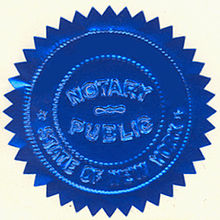- Notary public (New York)
-
 An Embossed Notary Seal. This type of seal is no longer legally sufficient in New York State.
An Embossed Notary Seal. This type of seal is no longer legally sufficient in New York State.
Notaries public in New York are commissioned by the Secretary of State of New York after passing a short examination in law and procedure.[1] A notary's commission is received from and kept on file with the county clerk of the county in which they reside or do business, but notaries are empowered to actually perform their duties anywhere in the state.
Contents
Requirements
Notaries must be residents of the state or have a business in the state.[2][3] Attorneys at law may automatically be appointed notaries simply by submitting the filing fee.[3] Someone who is a commissioner or inspector of elections may also be a notary.[4] One designated employee of the county clerk may be appointed a notary without taking the test.[5] A state legislator may also be a notary, without any conflict of interest.[6] Since the passage of the Married women's property acts in the mid-19th century, a married woman could be a notary.[3][7]
Certain persons can not be licensed as a notary in New York.[3] These include a non-citizen,[2] someone who neither has a residence nor a business in New York,[2] a person convicted of certain felonies,[2] a person removed from office as notary or commissioner of deeds,[8] and convicted draft dodgers.[9] The New York Notary Association provides training and exam preparation at http://www.NotaryPublicNewYork.com. By a quirk of New York law that bars them from holding any other office, sheriffs may not be appointed notaries.[3][10]
Powers
New York notaries are empowered to administer oaths and affirmations (including oaths of office),[11] to take affidavits and depositions,[12] to receive and certify acknowledgments or proof of deeds, mortgages and powers of attorney and other instruments in writing.[3][13] Notaries may also demand acceptance or payment of foreign and inland bills of exchange, promissory notes and obligations in writing.[3][14] Finally, they can witness the opening of a safe deposit box.[15]
Notaries have no other powers: notably (as emphasized by official publications) they may not certify copies of documents (for instance, "I hereby certify that this is a true and correct copy...," is something beyond the authority of a New York State notary) However, a notary may sign a form of affidavit on a copy where the document's custodian him/herself signs and swears to the authenticity of the document (usually a government issued picture ID). This can suffice as a "notarized copy" in most instances, but is not a certified copy. A Notary cannot prepare legal documents, offer any advice, or review documents for legality (even offering an opinion as to whether a document needs notarization is considered to be "practicing law without a license" in New York); and they may not solemnize marriages. Further, notaries in New York are specifically warned not to notarize last wills and testaments: in New York, wills must be attested to by two witnesses (who need not be notaries), and a will witnessed by a notary is not thereby validated, a source of confusion for many people. An attorney who is also licensed as a Notary Public may notarize a persons signature to a will, thereby rendering it recordable.[3]
Seal or stamp
New York does not require that notaries use an official seal or stamp - the embossed seal illustrated above is, in fact, now a decorative addition to a document rather than a requirement of law, and is itself insufficient for a notarization. New York notaries may write in black ink, or may stamp with a rubber stamp, the required information for notarization: their name; the words "Notary Public, State of New York"; the county in which they are qualified (that is, the county in which the county clerk holds their original certificate and signature card); the county which additional signature certificates are filed (done for convenience of authenticating their notarizations); the date that the notary's commission expires (commissions are renewed every four years); and, only if qualified in New York City (the counties of The Bronx, Richmond, Kings, Queens and New York) a registration number. This information, with the notary's signature and the date and place of notarization are required for a legal notarization.
John Doe Notary Public, State of New York Qualified in Bronx County No. 12345 My commission expires January 1, 20....
A typical layout for a notary's rubber stamp, for use beneath the notary's signature.
Notaries may charge fees (the maximum is $2), but many choose to waive them (for instance, for clients and customers of their other services; for example, many banks have notaries on duty to serve their depositors for free).[16] Each county clerk also has a notary on duty in the clerk's office to serve the public at no charge.
New York has another official similar to a notary, a commissioner of deeds.
References
- ^ Welcome to the Division of Licensing from the NY Secretary of State's official government website
- ^ a b c d N.Y. Executive Law § 130.
- ^ a b c d e f g h Notary Public License Law from the NY Secretary of State's official government website
- ^ N.Y. Elections Law §§ 3-200, 3-400.
- ^ N.Y. Public Officers Law § 534.
- ^ 1927 Op. (N.Y.) Atty. Gen. 97.
- ^ N.Y. Real Property Law § 302.
- ^ N.Y. Executive Law § 140.
- ^ N.Y. Public Officers Law § 3.
- ^ New York Constitution Article XIII, § 13(a)
- ^ N.Y. Public Officers Law §§ 10, 69.
- ^ N.Y. CPLR Rule 3113.
- ^ N.Y. Real Property Law §§ 290 (3),298, 302, 303, 304, 306, 309.
- ^ N.Y. Executive Law § 135.
- ^ N.Y. Banking Law § 335.
- ^ N.Y. Executive Law § 136.
Categories:- New York law
- Region-specific legal occupations
- Notary
Wikimedia Foundation. 2010.
